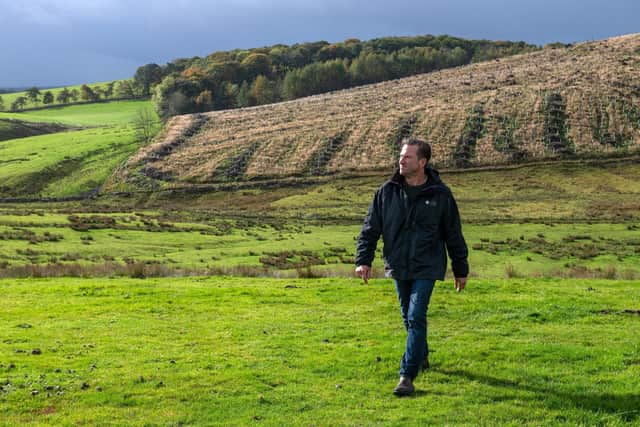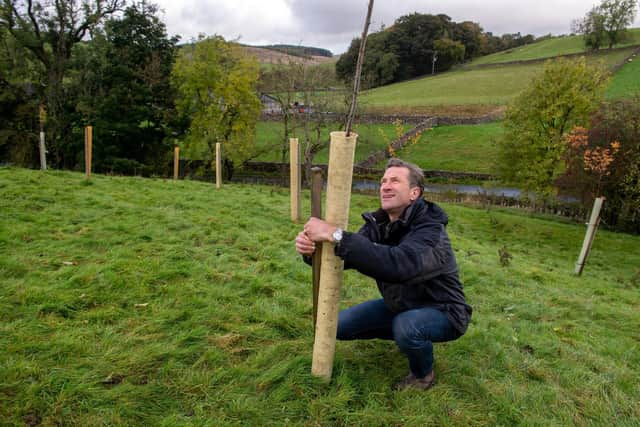Meet the movie screenwriter fighting to rewild the Yorkshire Dales by banning plastic tree guards and cutting verges
Bruce McLeod has written several movie screenplays, but it is in his role as chair of Friends of The Dales that he now finds himself fighting for the future of the countryside.
Bruce, who took on his role in 2019 after having been a member previously of CPRE in North Yorkshire, said the work being undertaken by Friends of the Dales in organising volunteer tree guard collection and pushing for a sensible regime over the cutting of countryside verges to encourage wildflowers were both important and areas that could be influenced.


Advertisement
Hide AdAdvertisement
Hide Ad“One of Friends of the Dales’ main goals is to make sure people know who we are and what we do. We are a small charity organisation that punches above its weight on the impact we have in being able to lobby, criticise and raise consciousness effectively.
“When we chose to take up the campaign against single-use plastic, in particular concentrating on the future elimination of all plastic tree guards I felt it was an easy win for us.
“There are over three million plastic tree guards in the Dales and many more millions throughout the UK and about half are redundant. The problem of these plastic tree guards is huge. When they have unzipped themselves when the tree is growing they are often left lying on the ground and eventually disappear underneath growth around the tree.
“People are becoming more aware of the effects of disintegration into micro plastics, how soil can be affected and how pollution can eventually be made to water courses.


Advertisement
Hide AdAdvertisement
Hide Ad“We felt that organising a campaign to target a clear-up of this redundant plastic would appeal to all ages but would particularly appeal to a younger audience that are, for the most part, very passionate about the environment and are understandably quite anxious about the future.”
Bruce and many others took part in an official plastic tree guard collection event in a private woodland near Long Preston earlier this month and he said the day proved a huge success but also highlighted the long journey that is required.
“We collected around 2,500 redundant tree guards in a couple of hours but there is a far bigger task. Our position in Friends of The Dales is that plastic tree guards should stop being used immediately. Every day there are stories of money for millions more trees being planted and mostly using plastic tree guards.
“The conundrum is that most of the money that is being put towards planting trees is coming from us, for the good of the environment, but then if each tree is wrapped in plastic how can that be good? There is talk of ‘public money for public goods’ but is this a public good if the plastic is leading to the degradation of the environment?
Advertisement
Hide AdAdvertisement
Hide Ad“Tree guards are a far greater problem than plastic bottles being dumped in the countryside, which is why they need to be outlawed.
“There are alternative compostable tree guards available and perhaps the most exciting one is what the Woodland Trust is going for that is made from British sheep’s wool with cashew and castor oil. I’ve tried them at home and they look and smell good too. Cardboard guards have been proven to hold up fine too.”
Bruce said that there is also a case for the non-use of tree guards altogether.
“What happened over 50 years ago before tree guards were used at all? Woodlands are very good at regenerating themselves. Perhaps we should look at how that is facilitated once again?”
Advertisement
Hide AdAdvertisement
Hide AdFriends of the Dales’ approach has been adopted UK-wide with nine out of the twelve other ‘Friends of’ organisations that work with other national parks joining the campaign. Bruce said the greater the number the bigger the impact that can be made on ridding the countryside of the plastic tree guards.
“Our campaign has a number of fronts. We want to continue promoting what we are doing, increase our number of members available to collect the redundant plastic and take the campaign to a national level.
“From my point of view plastic is a pollution that has to be cleaned up, like an oil spill you just can’t hope it will simply wash away.
“You have to do something about it. The current practice of using plastic tree guards in woodland creation or maintenance is unsustainable.”
Advertisement
Hide AdAdvertisement
Hide AdBruce said the other major campaign Friends of the Dales are currently involved with is one that sees them trying to reach those who are responsible for the cutting of verges on country lanes.
“Often the cutting of verges takes place just at the time when wildflowers are starting to appear and this can devastate them. There is a very suburban based notion that everything in the countryside needs tidying up, but sometimes the worst possible thing is to keep it tidy.
“I’m not suggesting everything should go totally unattended but we should allow nature to take more of its own course and allow things to be a bit wilder.
“We are in talks with North Yorkshire County Council to push the change in cutting regimes to allow the wildflowers to bloom. We need to find out who is responsible for the cutting in each area and raise this awareness.”
Advertisement
Hide AdAdvertisement
Hide AdBruce said there will be an encouragement of the public in the springtime and in particular during May, when the cutting normally takes place, to take photographs of themselves on verges resplendent with wildflowers.
“A lot of verges are remnants of wildflower meadows. We just want to facilitate their reappearance. We are not against cutting, just at the right time.
“In one area we have already heard of a Best Kept Village competition now incorporates a class for best wilder area.”
